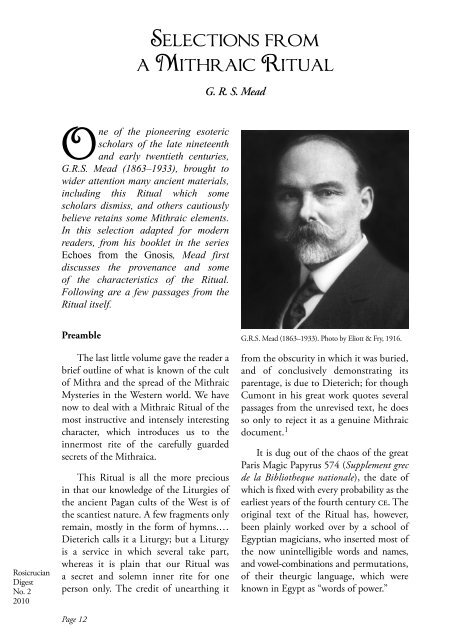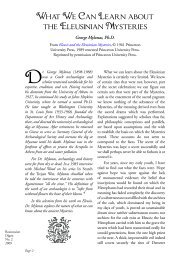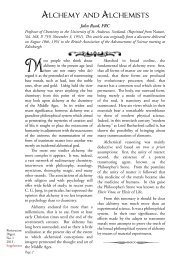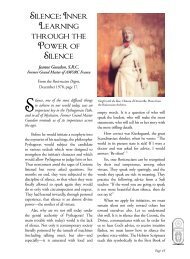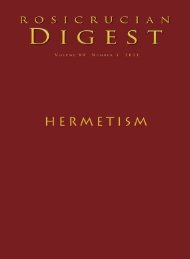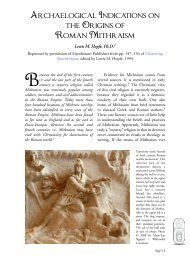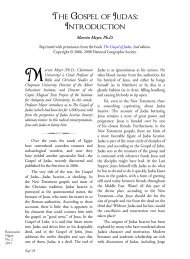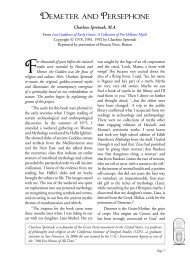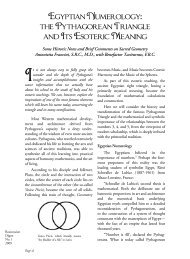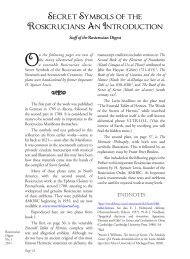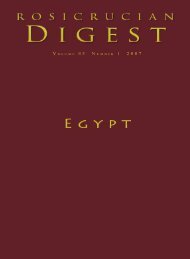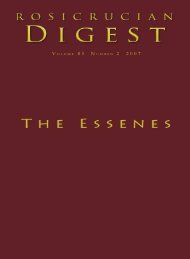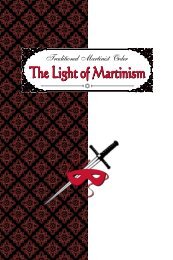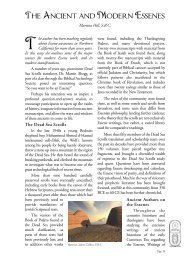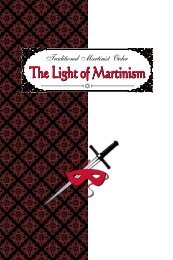Selections from a Mithraic Ritual - Rosicrucian Order
Selections from a Mithraic Ritual - Rosicrucian Order
Selections from a Mithraic Ritual - Rosicrucian Order
You also want an ePaper? Increase the reach of your titles
YUMPU automatically turns print PDFs into web optimized ePapers that Google loves.
<strong>Selections</strong> <strong>from</strong><br />
a <strong>Mithraic</strong> <strong>Ritual</strong><br />
G. R. S. Mead<br />
One of the pioneering esoteric<br />
scholars of the late nineteenth<br />
and early twentieth centuries,<br />
G.R.S. Mead (1863–1933), brought to<br />
wider attention many ancient materials,<br />
including this <strong>Ritual</strong> which some<br />
scholars dismiss, and others cautiously<br />
believe retains some <strong>Mithraic</strong> elements.<br />
In this selection adapted for modern<br />
readers, <strong>from</strong> his booklet in the series<br />
Echoes <strong>from</strong> the Gnosis, Mead first<br />
discusses the provenance and some<br />
of the characteristics of the <strong>Ritual</strong>.<br />
Following are a few passages <strong>from</strong> the<br />
<strong>Ritual</strong> itself.<br />
<strong>Rosicrucian</strong><br />
Digest<br />
No. 2<br />
2010<br />
Preamble<br />
The last little volume gave the reader a<br />
brief outline of what is known of the cult<br />
of Mithra and the spread of the <strong>Mithraic</strong><br />
Mysteries in the Western world. We have<br />
now to deal with a <strong>Mithraic</strong> <strong>Ritual</strong> of the<br />
most instructive and intensely interesting<br />
character, which introduces us to the<br />
innermost rite of the carefully guarded<br />
secrets of the <strong>Mithraic</strong>a.<br />
This <strong>Ritual</strong> is all the more precious<br />
in that our knowledge of the Liturgies of<br />
the ancient Pagan cults of the West is of<br />
the scantiest nature. A few fragments only<br />
remain, mostly in the form of hymns.…<br />
Dieterich calls it a Liturgy; but a Liturgy<br />
is a service in which several take part,<br />
whereas it is plain that our <strong>Ritual</strong> was<br />
a secret and solemn inner rite for one<br />
person only. The credit of unearthing it<br />
Page 12<br />
G.R.S. Mead (1863–1933). Photo by Eliott & Fry, 1916.<br />
<strong>from</strong> the obscurity in which it was buried,<br />
and of conclusively demonstrating its<br />
parentage, is due to Dieterich; for though<br />
Cumont in his great work quotes several<br />
passages <strong>from</strong> the unrevised text, he does<br />
so only to reject it as a genuine <strong>Mithraic</strong><br />
document. 1<br />
It is dug out of the chaos of the great<br />
Paris Magic Papyrus 574 (Supplement grec<br />
de la Bibliotheque nationale), the date of<br />
which is fixed with every probability as the<br />
earliest years of the fourth century ce. The<br />
original text of the <strong>Ritual</strong> has, however,<br />
been plainly worked over by a school of<br />
Egyptian magicians, who inserted most of<br />
the now unintelligible words and names,<br />
and vowel-combinations and permutations,<br />
of their theurgic language, which were<br />
known in Egypt as “words of power.”
It is exceedingly probable, therefore,<br />
that we have in this <strong>Ritual</strong> of initiation<br />
certain theurgic practices of Egyptian<br />
tradition combined with the traditional<br />
<strong>Mithraic</strong> invocations done into Greek.<br />
As to the chanting of the vowels, it is of<br />
interest to learn <strong>from</strong> Demetrius, On<br />
Interpretation, that:<br />
In Egypt, the priests hymn the<br />
gods by means of the seven vowels,<br />
chanting them in order; instead<br />
of the pipe and lute the musical<br />
chanting of these letters is heard.<br />
So that if you were to take away<br />
this accompaniment you would<br />
simply remove the whole melody<br />
and music of the utterance (logos). 2<br />
The statement of Nicomachus of<br />
Gerasa the “musician” and mystic (second<br />
century ce), is still clearer; for he not only<br />
tells us about the vowels and consonants,<br />
but also of certain other “unarticulated”<br />
sounds which were used by the theurgists...<br />
In speaking of the vowels or “sounding<br />
letters”—each of the seven spheres being<br />
said to give forth a different vowel or<br />
nature-tone—Nicomachus informs us that<br />
these root-sounds in nature are combined<br />
with certain material elements, as they are<br />
in spoken speech with the consonants; but<br />
“just as the soul with the body, and music<br />
with the lyre-strings, the one produces<br />
living creatures and the other musical<br />
modes and tunes, so do those root-sounds<br />
give birth to certain energic and initiatory<br />
powers of divine operations…. 3<br />
As we have said, the <strong>Ritual</strong> before us<br />
is not of the nature of a church or temple<br />
service; on the contrary, it contains<br />
directions for a solitary sacrament, in<br />
which the whole effort of the celebrant<br />
is to stir into activity, and bring into<br />
conscious operation, his own hidden<br />
nature or the root-substance of his being.<br />
It is a yoga-rite (unio mystica), or act for<br />
union, in which the physical breath, the<br />
etheric currents, and the psychic auræ, or<br />
life-breaths, or prana’s, work together with<br />
the inbreathing of the Great Breath, or<br />
Holy Spirit, or Atomic Energy.<br />
Excerpts <strong>from</strong> The <strong>Ritual</strong>:<br />
The Father’s Prayer:<br />
O Providence, O Fortune, bestow<br />
on me Thy Grace—imparting<br />
these the Mysteries a Father only<br />
may hand on, and that, too, to a<br />
Son alone—his Immortality—an<br />
initiate, worthy of this our Craft,<br />
with which Sun Mithras, the<br />
Great God, commanded me to be<br />
endowed by His Archangel; so that<br />
I, Eagle, as I am, by mine own self<br />
alone, may soar to Heaven, and<br />
contemplate all things.<br />
The Invocatory Utterance<br />
O Primal Origin of my origination;<br />
Thou Primal Substance of my<br />
substance; First Breath of breath,<br />
the breath that is in me; First Fire,<br />
God-given for the Blending of the<br />
blendings in me, First Fire of fire<br />
in me; First Water of my water, the<br />
water in me; Primal Earth-essence<br />
of the earthy essence in me; Thou<br />
Perfect Body of me—son of my<br />
N. father and N. my mother—<br />
fashioned by Honoured Arm and<br />
Incorruptible Right Hand, in<br />
World that’s lightless, yet radiant<br />
with Light, in World that’s soulless,<br />
yet filled full of Soul!<br />
Utterances<br />
Silence! Silence! Silence! The Symbol<br />
of the Living God beyond Decay.<br />
O Silence! Silence! I am a Star,<br />
whose Course is as your Course,<br />
shining anew <strong>from</strong> out the depth!<br />
Page 13
ëeö · oëeö · iöö · oë · ëeö · ëeö ·<br />
oëeö · iöö · oëëe · öëe · öoë ·ië ·<br />
ëö · oö · oë · ieö · oë · öoë · ieöoë ·<br />
ieeö · eë · iö · oë · ioë · öëö · eoë ·<br />
oeö · öië · öiëeö · oi · iii · ëoë · öuë<br />
· ëö · oëe · eöëia · aëaeëa · ëeeë ·<br />
eeë · eeë · ieö · ëeö · oëeeoë · ëeö ·<br />
euö · oë · eiö · ëö · öë · öë · öë · ee<br />
· ooouiöë!<br />
Draw nigh, O Lord!<br />
Hail Guardians of the Pivot, ye,<br />
sacred sturdy Youths, who all at<br />
once, revolve the spinning Axis of<br />
Heaven’s Circle, ye who let loose<br />
the thunder and the lightning, and<br />
earthquake-shocks and thunderbolts<br />
upon the hosts of impious<br />
folk, but who bestow on me, who<br />
pious am and worshipper of God,<br />
good-health, and soundness of my<br />
frame in every Part, and Proper<br />
stretch of hearing and of sight,<br />
and calm, in the now Present<br />
good-hours of this day, O mighty<br />
Ruling Lords and Gods of me!<br />
Hail Lord, Thou Master of the<br />
Water! Hail, Founder of the Earth!<br />
Hail, Prince of Breath!<br />
O Lord, being born again, I Pass<br />
away in being made Great, and,<br />
having been made Great, I die.<br />
Being born <strong>from</strong> out the state of<br />
birth-and-death that giveth birth<br />
to mortal lives, I now, set free,<br />
pass to the state transcending<br />
birth, as Thou hast established it,<br />
according as Thou hast ordained<br />
and made, the Mystery. 4<br />
ENDNOTES<br />
1<br />
However, Marvin W. Meyers includes this<br />
“<strong>Mithraic</strong> Liturgy” in his 1987 Sourcebook<br />
and affirms its <strong>Mithraic</strong> aspects: “The so-called<br />
Mithras Liturgy is one of the most interesting<br />
and perplexing of texts concerning the worship<br />
of Mithras in late antiquity….[It] manifests a<br />
syncretistic piety that makes use of astrology and<br />
magic in order to provide a liturgical spell for the<br />
ecstatic ascent of the soul to god. Although we<br />
cannot agree with Albrecht Dieterich that the<br />
Mithras Liturgy preserves the highest sacrament<br />
of <strong>Mithraic</strong> initiation, the text does contain several<br />
clearly <strong>Mithraic</strong> themes.” Marvin W. Meyers, The<br />
Ancient Mysteries: A Sourcebook (San Francisco:<br />
Harper and Row, 1987), 211–212.<br />
2<br />
Demetrius of Phaleron, De Elocutione Ch 71,<br />
Ed. Ludwig Radermacher (Leipzig: Tübner,<br />
1901), 20.<br />
3<br />
Nichomachus of Gerasa (ca. 60–120). In Mead’s<br />
notes, he cites this as “Nichomachus c. 6,” however<br />
the specific reference has not been found by<br />
subsequent editors.<br />
4<br />
The complete text of Mead’s Preamble, his<br />
translation of the full ritual, and his commentary<br />
may be found at http://hermetic.com/pgm/<br />
mithraic.html.<br />
<strong>Rosicrucian</strong><br />
Digest<br />
No. 2<br />
2010<br />
Page 14


